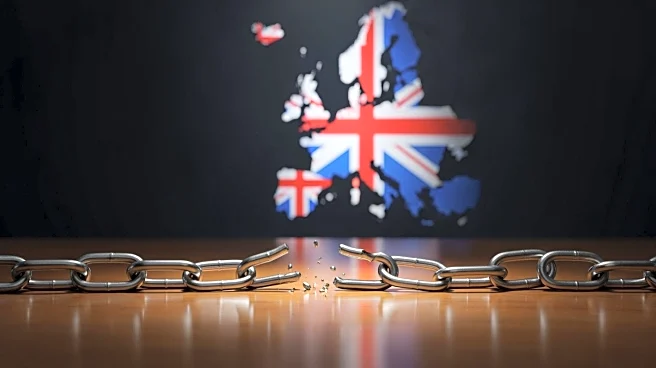What's Happening?
The UK Chancellor, Rachel Reeves, has publicly acknowledged the long-term economic damage caused by the Brexit deal, specifically highlighting a 4% productivity hit as calculated by the Office for Budget
Responsibility (OBR). This statement was made during an international economic committee meeting at the International Monetary Fund (IMF), attended by leading finance ministers and central bankers. The Chancellor emphasized the compounded productivity challenges faced by the UK due to its departure from the European Union. This acknowledgment marks a shift in the Labour Party's approach, which had previously been reluctant to stress the economic downsides of Brexit. The government is preparing for the upcoming Budget on November 26, where tax rises are expected to address the downgraded productivity forecast.
Why It's Important?
The Chancellor's remarks underscore the significant impact of Brexit on the UK's economic landscape, particularly in terms of productivity. This acknowledgment is crucial as it sets the stage for potential policy changes and economic strategies aimed at mitigating the adverse effects. The anticipated tax increases in the upcoming Budget reflect the government's efforts to stabilize public finances amidst these challenges. The broader implications include potential shifts in trade negotiations and economic policies, as the UK seeks to strengthen trade ties and adapt to post-Brexit realities. Stakeholders such as businesses, investors, and policymakers will be closely monitoring these developments, as they could influence investment decisions and economic growth trajectories.
What's Next?
The UK government is expected to outline detailed measures in the forthcoming Budget to address the productivity downgrade. This includes potential tax hikes and adjustments to trade policies, particularly concerning post-Brexit checks on food and farm trade. The government is also exploring opportunities for UK manufacturers to participate in European defense consortia. These steps are part of a broader strategy to reset Brexit negotiations and enhance economic resilience. The Office for Budget Responsibility will provide further insights into the economic forecast, which will be pivotal in shaping future policy decisions. European ministers have urged ambitious negotiations to mitigate global trade tensions, which could influence the UK's approach.
Beyond the Headlines
The Chancellor's acknowledgment of Brexit's economic impact may lead to deeper discussions on the UK's long-term economic strategy and its role in the global economy. Ethical considerations regarding the transparency of economic forecasts and the government's accountability in addressing these challenges may arise. Additionally, cultural shifts in public perception of Brexit and its consequences could influence political discourse and voter sentiment. The government's approach to international trade and collaboration with European partners may also evolve, reflecting a more pragmatic stance in navigating post-Brexit challenges.










